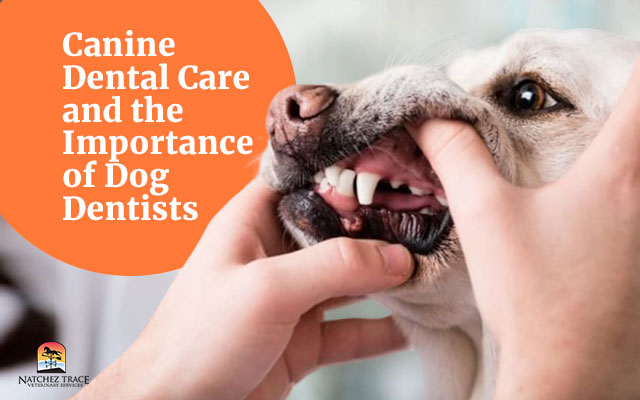Our canine companions bring boundless joy into our lives, and ensuring their well-being involves more than just love and care. Canine dental health is a critical aspect that contributes to their overall happiness and longevity.
Check out this informative video featuring Dr. Marc Smith, where he outlines the signs that indicate when your dog may need dental cleaning.
In this article, we discuss canine dental care, highlighting the significance of regular maintenance and offering valuable tips for tartar removal at home. We also explore the pivotal role of a dog dentist in preserving your pet’s oral health.
Why Canine Dental Care Matters
Proactively addressing your dog’s dental needs extends beyond maintaining a gleaming smile. It significantly impacts overall health, is a formidable preventive measure against dental issues, and establishes a connection between dental well-being and longevity. Let’s delve into each aspect to unravel the profound importance of prioritizing canine dental care:
Impact on Overall Health
The condition of your dog’s teeth and gums is intricately linked to their overall health.
If left unchecked, dental problems can lead to systemic issues affecting vital organs such as the heart and kidneys.
Understanding the holistic impact of dental health on your furry friend’s well-being emphasizes the need for regular dental care practices including consulting with a dog dentist.
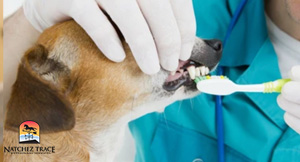 Prevention of Dental Issues
Prevention of Dental Issues
Canine dental care is a proactive defense against a spectrum of dental problems.
Implementing preventive measures, such as regular brushing and dental-friendly toys, can significantly reduce the risk of issues like periodontal disease, gingivitis, and cavities.
This preventive approach ensures your dog’s comfort and minimizes potential veterinary expenses.
Connection Between Dental Health and Longevity
 Studies have shown a compelling correlation between good dental health and an extended lifespan in dogs.
Studies have shown a compelling correlation between good dental health and an extended lifespan in dogs.
Maintaining healthy teeth and gums allows your canine companions to enjoy a higher quality of life as they age.
Proper dental care’s longevity benefits underscore its significance in fostering a lasting bond with your pet.
In this section, we’ll explore each dimension, providing a comprehensive understanding of why prioritizing canine dental care and regularly visiting a dog dentist is essential to responsible pet ownership.
Common Canine Dental Problems
Effective canine dental care involves recognizing and addressing common dental problems affecting your furry friend. Understanding these issues enables you to take proactive measures to maintain optimal oral health. Let’s explore the most prevalent canine dental problems:
Periodontal Disease
Periodontal disease is a widespread dental issue in dogs characterized by inflammation and infection of the supporting structures around the teeth. Without proper care, it can lead to tooth loss and impact overall health by releasing harmful bacteria into the bloodstream.
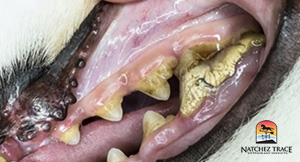 Dental Tartar and Plaque
Dental Tartar and Plaque
Tartar and plaque buildup on your dog’s teeth can contribute to various dental problems. Plaque, a sticky film of bacteria, can harden into tartar over time.
If not addressed, tartar accumulation may lead to gingivitis, bad breath, and even more severe dental issues.
Gingivitis
Gingivitis is inflammation of the gums, often caused by plaque and tartar accumulation. Redness, swelling, and bleeding are common signs of gingivitis. Timely intervention is crucial to prevent the progression of this condition.
Tooth Decay and Cavities
While less common than humans, dogs can experience tooth decay and cavities. This can result from various factors, including poor dental hygiene, certain dietary choices, and genetic predispositions. Identifying and addressing decay early is vital to prevent further complications.
In this section, we’ll delve into these common canine dental problems, offering insights into their causes, symptoms, and preventive measures to keep your dog’s smile radiant and healthy.
Signs of Dental Issues in Dogs
Proactively monitoring your dog’s behavior and habits is crucial for early detection and intervention in dental issues. Dogs may not express their discomfort verbally, but certain signs can indicate potential problems with their oral health. Here are key signs to watch for:
Bad Breath
Persistent bad breath, often noticeably foul or unpleasant, can signify dental issues. While dog breath isn’t expected to be minty fresh, a sudden and persistent change in odor warrants attention.
Difficulty Chewing
If your dog displays hesitancy or difficulty while chewing, it could indicate pain or discomfort related to dental problems.
Changes in chewing behavior, such as favoring one side or avoiding certain foods, should be observed closely.
Pawing at the Mouth
Dogs may instinctively paw at their mouths if they experience pain or irritation.
Persistent pawing or rubbing the face against surfaces can indicate oral discomfort.
Changes in Eating Habits
 A sudden reluctance to eat, dropping food, or a shift in eating patterns can be linked to dental issues.
A sudden reluctance to eat, dropping food, or a shift in eating patterns can be linked to dental issues.
Discomfort while chewing may lead to a decreased appetite or selective eating.
Being attuned to these signs allows you to address potential dental problems promptly, ensuring your dog’s well-being.
The next section will elaborate on each sign, providing insights into their significance and potential implications for your furry companion’s oral health.
The Role of a Dog Dentist
Dedicated dental care for dogs involves collaboration with veterinary dentistry professionals. Understanding the role of a dog dentist, the importance of their expertise, and when to seek their services is pivotal for maintaining your canine companion’s oral health.
What is a Dog Dentist?
A dog dentist, or veterinary dentist, is a specialized veterinarian with advanced training in diagnosing, treating, and preventing dental issues in dogs. A professional dog dentist possesses the knowledge and skills to address a wide range of oral health concerns specific to canine patients.
Importance of Veterinary Dentistry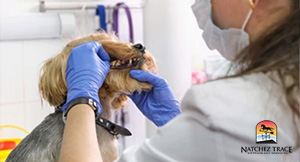
Veterinary dentistry plays a crucial role in ensuring the overall well-being of dogs.
Beyond maintaining a sparkling smile, proper dental care prevents systemic health issues related to oral infections.
A dog dentist can perform dental cleanings and extractions and address specific dental conditions that may impact your dog’s quality of life.
When to Consult a Dog Dentist
Knowing when to consult a dog dentist is essential for proactive care. Routine dental check-ups should be a part of your dog’s healthcare regimen.
Specific signs, such as persistent bad breath, visible changes in the teeth or gums, and behavioral indications of oral discomfort, warrant prompt consultation with a dog dentist.
3 Tartar Removal Tips Without a Dog Dentist
Maintaining your dog’s dental hygiene doesn’t always require a trip to the dog dentist. Incorporating effective tartar removal strategies into your routine can improve your dog’s oral health. Here are practical tips on how to remove tartar from dog teeth without the need for a dog dentist:
Canine Dental Wipes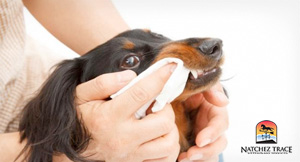
Dental wipes designed for dogs provide a convenient way to remove plaque and tartar. Gently wiping your dog’s teeth with these specialized wipes can help control the buildup of dental deposits. This approach is particularly useful for dogs that are resistant to traditional toothbrushing.
Special Dental Diets
Specific dog food formulations are crafted to support dental health. These dental diets often have a texture that aids in mechanically cleaning the teeth while chewing. Additionally, they may contain ingredients that reduce plaque and tartar formation.
Water Additives for Oral Health
Dental water additives are designed to be added to your dog’s drinking water. These additives often contain antimicrobial agents that help combat plaque-forming bacteria. As your dog drinks, the oral solution promotes a healthier environment inside its mouth.
Discovering effective tartar removal methods suited to your dog’s preferences and lifestyle can significantly contribute to their ongoing dental care. The next section will explore these tips in more detail, offering insights into their application and benefits for maintaining your dog’s oral hygiene.
Nurturing Your Dog’s Dental Wellness for a Lifetime of Joy
In conclusion, the well-being of your canine friend extends beyond cuddles and playtime—it involves dedicated attention to their dental health. From understanding common dental problems to exploring tartar removal tips without needing a dog dentist, you’ve gained valuable insights into providing comprehensive dental care.
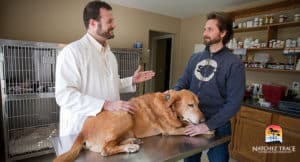 As you embark on this journey, remember the importance of regular dog dentist check-ups and the encouragement to stay informed about evolving dental care practices.
As you embark on this journey, remember the importance of regular dog dentist check-ups and the encouragement to stay informed about evolving dental care practices.
Your commitment to proactive dental care empowers you to be the best advocate for your furry companion’s overall well-being. With every wag of the tail and joyful bark, your dog communicates its happiness, and by prioritizing its dental health, you contribute to a life filled with comfort, health, and companionship. Here’s to many more years of shared smiles and moments of joy with your beloved canine companion!
For your dog’s dental health concerns, consult with our veterinarian.
People Also Ask:
- Q: How often should I check my dog’s teeth for signs of dental issues?A: You should examine your dog’s teeth regularly, ideally a few times a week. Look for signs such as bad breath, red or swollen gums, and changes in eating habits. Early detection can help prevent dental problems.
- Q: Can I use human toothpaste for my dog’s dental care?A: No, using human toothpaste is not recommended for dogs. It often contains ingredients harmful to pets. Choose a canine toothpaste with flavors appealing to dogs, making the dental care experience more enjoyable for you and your furry friend.
- Q: Are water additives effective for maintaining my dog’s oral health?A: Yes, water additives can be beneficial. They often contain enzymes or antimicrobial agents that help combat plaque and bacteria in your dog’s mouth. However, they are a supplemental measure, and regular dental check-ups and cleanings remain essential for comprehensive care.

